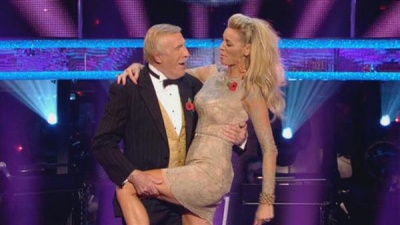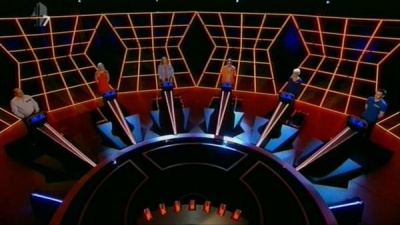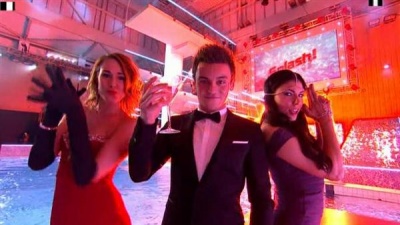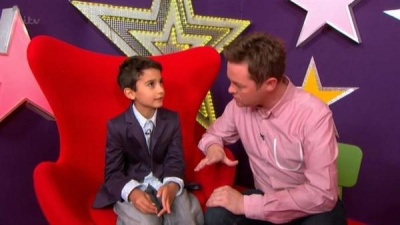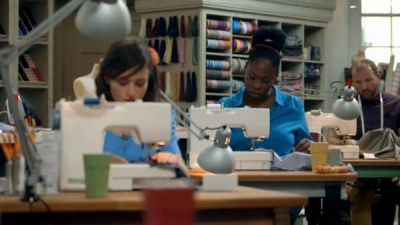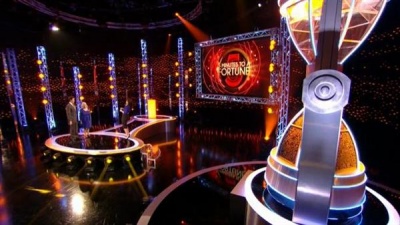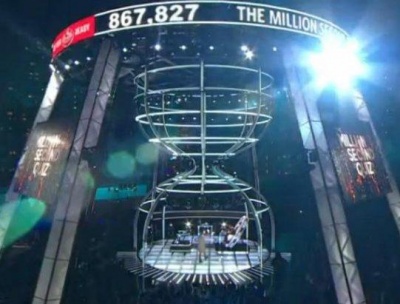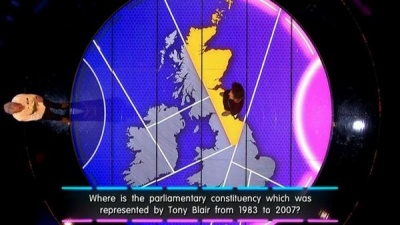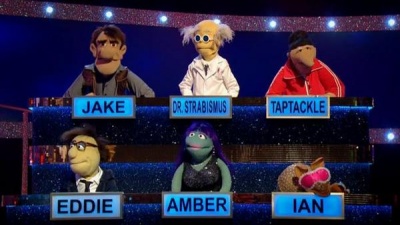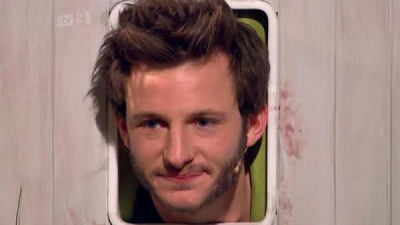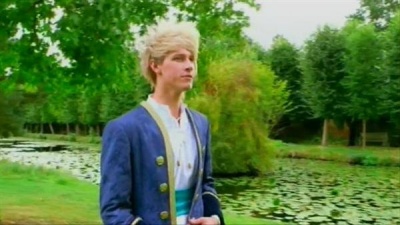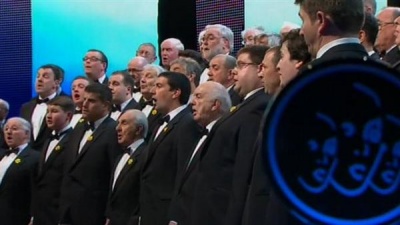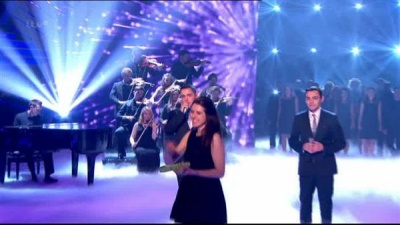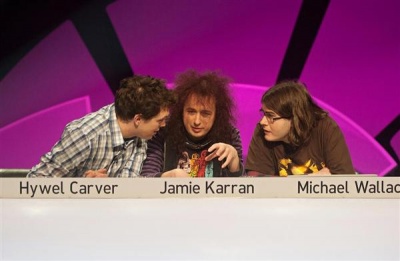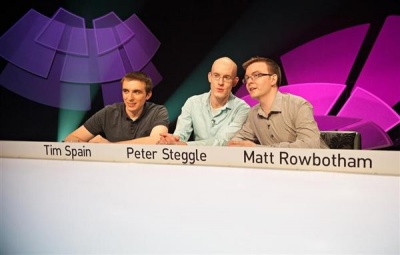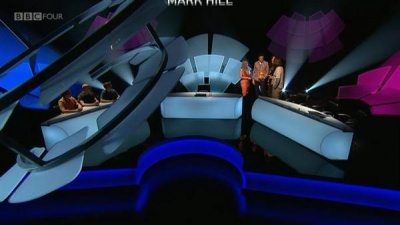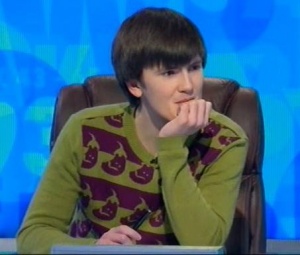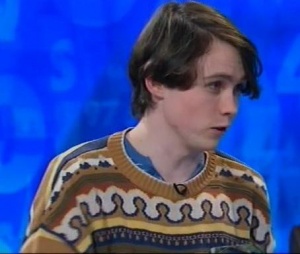Weaver's Week 2013-12-29
Last week | Weaver's Week Index | Next week
The Week of the Year, 2013
For this year's review, we have a theme.
Twelve shiny dancers
This year, BBC1 was the big winner. Strictly Come Dancing had everything the corporation could throw at it: a promotional campaign that came in with September and didn't finish until Christmas night. There was a conversation between host Bruce Forsyth and a leading sitcom player, there was the traditional spin-off on BBC2, and promos masquerading as news across the corporate output. The show was helped by a predictable Saturday start time – 6.30 is Strictly o'clock – and by the Sunday show actually containing some dancing relevant to the contest. But, mostly, Strictly Come Dancing worked because it was light-hearted and enjoyable television. The only bad feeling was against the pantomime baddies, the contestants supported each other. It was feel-good television.
Feel-good television, without anything nasty, was a common theme across BBC1's other successes this year. One Man and His Dog popped into the Countryfile slot for a week, and finished in the year's top ten most-seen shows. Let's Dance for Comic Relief is intended as entertainment with a bit of charity, and succeeded in its aims. Even though it's as competitive as anything, Masterchef always strikes us as an uplifting programme: these cooks and celebrities are challenging themselves, pushing the limits of their cookery, and all are learning something.
Elsewhere in primetime, the corporation ran some shows that divided opinion. Britain's Brightest was a bold effort to test various forms of intelligence, let down by some dubious production decisions. Break the Safe was the culmination of a decade-long plan to have people counting 30 seconds in their head, but we found the game insufferably ponderous after the first round. I Love My Country was a sort of popular nationalism that BBC households associate with ITV, and ITV households associate with the BBC. The show wasn't to this column's taste, but we can see that some people will really mourn its passing.
BBC1's other output this year tended to be dark and gloomy, a trend reflected in the continued popularity of The Apprentice, number 7 in the chart of the year. Alan Sugar told the world that The Apprentice winner will not receive any direct mentoring from him, so clearly there's a slight renaming required for next year. Old favourites to return included Would I Lie to You, In It to Win It, and Who Dares Wins. Have I Got News for You also came back, with a very little comedy wheat to be found in tonnes of chaff.
Eleven Point Four Per Cent. Fewer Viewers
When its annual report comes out, Channel 4 will point to the many things it's doing well. The channel leads social media amongst UK broadcasters, though that's not a tremendously high bar. Channel 4's programmes get lots of awards, and audiences are broadly stable across the suite of channels. But the fact remains: the main Channel 4 has lost 11.4% of its viewers, and that's giving the advertisers a real scare. They're muttering about "no plan" and "no clear identity".
Certainly, we've picked up on that latter problem. What is Channel 4? It's meant to be innovative, it's meant to be ground-breaking, it's meant to push the frontiers, it's meant to give minority voices that wouldn't fit on the main ITV channel. Instead, Channel 4's game shows have tended to the derivative and the predictable. Big Fat Quiz spin-offs, 8 Out of 10 Cats trying to do other Channel 4 shows, endless repeats of Come Dine with Me. None of this is low-quality television, but all of these formats are pushing a decade old, if not more.
The new programmes tended to be familiar in their own right. Was It Something I Said? tried to meld social media with the ancient Quote... Unquote, and is certainly worthy of further consideration. Beat My Build was competitive home improvement and a success in daytime. Antiques valuation Four Rooms also moved to daytime, and remains an interesting format. But then we had The Common Denominator – a show superficially similar to Only Connect, but the rigour and humour got replaced by a large cash prize. And we had Face the Clock, a quiz version of Pass the Bomb, but without any atmosphere or tension.
Away from game shows, Channel 4 did have some sparks of originality. Educating Yorkshire hit a chord, and sparked a discussion about what teachers can do and what is the purpose of the education industry. Gogglebox – watching the reactions of people watching telly – also grew its audience. Maybe – maybe! – there is some hope for a novel idea from Channel 4 in the game show department. Until then, we're left with a needless revival of Fifteen-to-One, about which we have very low expectations.
Ten metres straight down
We were watching an old episode of iCarly this week; big brother Spencer was upset because he was missing Celebrities Jumping Into Water. Since that show was made two years ago, life has imitated parody, as seen on ITV's remarkably successful Splash! At heart, it's a bunch of celebrities jumping into water. The show is all heart: celebrities training to jump into water, celebrities actually jumping into water, replays of celebrities jumping into water from angles that don't help, and celebrities talking about celebrities jumping into water. Our tolerance for this was approximately zero, and we cannot see why the programme was so popular.
Theatre of the familiar was the reason for I'm a Celebrity's success: it was ITV's single most popular game show, and the second most popular across all channels. Over a decade, the format has been whittled down to cliché: viewers vote for a disliked person to do something silly involving witchety grubs, then vote them off in third place, allowing a former pop star to win. Completely predictable, but very popular.
Theatre of the familiar was everywhere on ITV this year. Saturday Night Takeaway came back after a three-year break, sadly still as creatively bereft as ever. The show will be touring to theatres next year, and this may be a good move: rather than having a new show every week, Ant and Dec can hone their performance of a small number of shows. Patrons in Torquay won't care that it's almost the same show the lads gave in Nottingham.
Catchphrase returned to primetime after twelve years, with Stephen Mulhern hosting in a relaxed style. Through the Keyhole ended a two-decade absence from the evening, but with Keith Lemon as the sole presenter, smut was never far away. Celebrity revivals of Family Fortunes and of Mr and Mrs continued. Prize Island didn't quite make it to primetime, there's a very funny low-fantasy show to be made on an island where white goods roam free to be hunted, but this wasn't it.
ITV's success of the year was Big Star's Little Star. A very simple programme, in which children talk about their famous parents, and raise a few wry smiles. The magic came from Stephen Mulhern's deft hosting; he used his skills and talents to bring out the best from the children, and did it all with such dexterity that he seemed to do very little. A low-stakes show, friendly and warm and feeling like we were all in a massive group hug.
Primetime turkey of the year has to be Food Glorious Food, Simon Cowell's search for a new dish to sell in stores nationwide. The show had lots of stars – Loyd Grossman, Carol Vorderman, Tom Parker Bowles – lots of tasting, and some shots of cookery. But it also had lots of talk about "the story behind the dish", something that Simon Cowell thinks is essential in any successful television show. The show wrapped itself in the flag, and surrounded itself with traditional symbols of the comfortable middle class. It's clear that comfortable middle-class patriotism isn't enough to make a successful show. Maybe Simon should stick to what he's good at.
Nine million bakers
Changes at the BBC have been most obvious on BBC2. Apart from politics and sport, the channel doesn't now originate any programmes before 6pm on weekdays. They were hoping to fill the gap with classic drama and comedy, but there was a problem with the rights, so most of the year was spent repeating decade-old editions of The Weakest Link, and almost-as-old episodes of Mastermind. The rights problem was sorted out in the early autumn, when BBC2 was part-way through the 2007-8 Series of Blessed Memory, and they've not bothered to finish that run.
Considering it has just five-and-a-quarter hours of new programmes per day, BBC2 has given us a good dollop of game shows this year. The biggest, by far, was The Great British Bake Off. The fourth run of Mel and Sue's Great Cake Hunt and Bread Quest attracted critical approval, and tabloid headlines, and an apparent spoiler from a professional chef. Almost nine-and-a-half million tuned in to see the winner crowned, putting Bake Off to number 5 in our chart of the year's top programmes.
Where there's a hit, there's a spin-off, both Mary Berry and Paul Hollywood have had series of their own resulting from Bake Off. Another competitive craft, sewing, was turned into competition; we reckoned that The Great British Sewing Bee fell below the high standards of Bake Off.
Elsewhere, there was little innovation on the BBC2 schedules. Eggheads began each evening's transmissions, quietly declining to mark its tenth anniversary in November. Mastermind continued in its Friday night slot (that's Saturday teatime for viewers in Wales), and University Challenge was so traditionalist that they didn't even find a new champion team. Great British Menu occupied some weeks in the spring, civilian and celebrity runs of Antiques Road Trip popped up, and Dragons' Den continued on its way.
The panel shows also continued: Mock the Week, QI, and Never Mind the Buzzcocks all tended to the predictable. So did the objections from grasping politicians who don't realise just how much a laughing stock they are. Just this week, disgraced former cabinet minister David Blunkett moaned that there was commentary and satire in the middle of an entertainment programme, and that political comment should be kept to delineated spaces. It's clear that Mr. Blunkett doesn't want the public to know about sordid stories like this one. A man who bends the rules in favour of someone he's dating, resigns from the cabinet, then gets three more jobs as directors of various companies – some of them selling to the department he ran until recently. Then he gets back in the cabinet after just eighteen weeks on the sidelines, and keeps the director jobs secret for six months until he's forced to resign again. Yes, we can see why Mr. Blunkett wants to keep the story of his life quiet.
Eight hourglasses
Motif of the year had to be the hourglass. It started big. Really big. Channel 4's best attempt at innovation this year was Five Minutes to a Fortune, a show where players tried to answer trivia questions, or find words in an eye-chart, or identify faces, or complete sums. And it was all done against the clock, with a hugemungous hourglass turning and losing them money. Those who got into the show found it gripping and compelling and barely missable. Such fans were rare, the show was pitched into the 5pm battleground and was quickly trampled underfoot. A great shame.
But the hourglass lived on. It had children, eight of them, and they took up home on ITV over the summer. Take on the Twisters was a delicate game, with six right answers in the main game required to play the cash bonus round, and then the person who came out with the most money stood to win it in the final. The races against the hourglasses was fun – six or eight would invert at a time, and whatever was still in play when the minute expired counted. But these races counted for just five minutes of the programme, the titular Twisters were not turning for 90% of the show. No replacement for The Chase, we're not expecting to see Twisters again.
Depressed with this critical reaction, the hourglass turned, sailed away, and made a new home for itself in New York. There, it invited Ryan Seacrest to present a completely incomprehensible show, Million Second Quiz. Again, people who liked it really liked it, and everyone else thought it too hard. Unlike the UK, enough people liked the show for it to come back. The hourglass is returning.
Seven teatime friends
That'll be four Chasers, Richard and Xander from Pointless, and The Machine from Tipping Point. Though, looking at the new shows starting, we think we might choose to write about this lot in greater depth next time.
Earlier in daytime, there's been a clearer battle; the children's programmes left BBC1 at the start of the year, allowing afternoon daytime programmes to shift over from BBC2. The net result is that Perfection joined Bargain Hunt and soap opera Doctors as typical BBC1 afternoon fare. The true-or-false quiz is no great shakes, but it seems to have enough fans. Pressure Pad came to air in November: the gimmick here was a laser-display floor, and a series of individual games that used it, to greater or lesser effect. The show will stand or fall on how much the afternoon audience loves John Barrowman, and can cope with the idea of players vanishing into thin air.
No such luck for Beat the Pack, a programme about picking off opponents one-by-one. Jake Humphrey was the able presenter, but the show was extended by a round too many, and too often was played for trivial prizes – after investing 40 minutes, we hope for something more than £250 or the opportunity to come back tomorrow.
Over on ITV, the mornings are filled with chat shows, and the afternoons with antiques shows like Secret Dealers and Dickinson's Real Deal. A couple of new programmes crossed our radar: Cook Me the Money was a competition between lunchtime food makers, presented in a manner uncannily similar to CBBC's Trade Your Way to the USA. Simultaneously more and less innovative was Show Me the Telly, an archive television quiz with Richard Bacon and Chris Tarrant. The choice of clips was often interesting, the accompanying quiz never quite felt right.
Six clever puppets
We're going to be criticised for lumping That Puppet Game Show alongside children's programmes, seeing as how the first episodes went out in the middle of primetime Saturday night. The final episodes went out in the middle of Sunday afternoon, and we rather suspect that Vernon and the other puppets won't even be allowed to return on CBBC. Especially not when Cookie Monster is appearing on Newsnight.
Shows clearly aimed at children fell into two camps. There were junior versions of grown-up formats: Trade Your Way to the USA was a version of The Apprentice without the pretence, Junior Bake Off was exactly what the title suggested. CITV's The Munch Box was another cookery show, perhaps most similar to 2014's proposed The Taste.
There was another run of Jedward's Big Adventure, featuring the most hyperactive tour guides in the nation. The very young were gently educated by Swashbuckle. Blue Peter You Decide asked viewers to pick their favourite presenter from three candidates; the weekly elimination format blew up in the producer's faces, but we defy anyone to say that Lindsey hasn't turned out to be even better than we expected. And it was evidence that the show had finally been forgiven for the most egregious failing of the 0898-gate scandals.
More daring viewing came in The Dare Devil, where a young person's family is challenged to do amazing things and win a day out together. Part of the prize is taking part, and working with the delicious acting of Dan Antopolski. Over on CITV, Fort Boyard came back for a new series, and we look forward to seeing the French teams try (and fail) at some of these games next summer. Un enfant du quatorze ans peut que fait! Gettez on avec it!
Five Viewers Left
Game shows aren't entirely confined to the four traditional PSB television channels. They're not entirely confined to radio, but it's been a quiet year on the wireless. Colin Murray embarrassed Clare Balding and left Fighting Talk – and broadcast radio – in shame, an Egghead won Brain of Britain, Junior Just a Minute saw Nicholas Parsons work with people young enough to be his great-great-grandchildren, and I'm Sorry I Haven't a Clue invited Richard Osman in a failed attempt to sound mildly relevant.
And so to the minor television channels, and the massively successful Celebrity Juice. The difference between Keith Lemon's show and all the other panel games is that it doesn't take itself seriously, and it makes a considerable effort to be funny and entertaining. People who watch the show regularly (read: not us) have suggested that the Juice is beginning to get a little stuck in its ways, but unlike HIGNFY is capable of renewing itself. The greatest tribute is a knock-off by a rival channel, and BBC3 tried with Sweat the Small Stuff, a programme managing to be less than the sum of its parts.
Amongst the talent show spin-offs, ITV2 did have some new shows of its own. Fake Reaction suffered from a clunky name, and never tried to be anything more than mildly gross, but reached these limited horizons with great aplomb. Release the Hounds was a one-off festival of scares for Hallowe'en; the format needs work, we'd not be surprised if it gets nominations for the quality of its cinematography.
Channel 5 has delusions of adequacy, it pretends that it's a mainstream channel, but this is only entirely undermined by the way it's remaking Channel 4 from ages ago. Motor Morphers and Beat the Ancestors saw engineering work in a manner entirely unlike anything Scrapheap Challenge had ever shown. Celebrity Super-Spa mixed beauty treatment and famous people working with trainees, nothing like Hotel GB from the year before. Big Brother continued, Channel 5 aired the television coverage, and demonstrated that they really don't know how to structure a series, or explain their work to the viewing thousands, or even convince the remaining lab rats when one of their number has been ejected. A year when the news was dominated by governments spying on their citizens concluded with the observation, "It's more likely Big Brother is watching you than you're watching Big Brother."
We earlier noted how Channel 4 sets great store by its digital channels' performance. E4's flagship game show this year was My Little Princess, a show where suitors had to impress both their potential date and her father. The programme had style, panache, attitude, and complete irreverence to the norms of dating shows. Such was the success that greeted this landmark production that it was delayed, from the unloved 10pm slot to a highly-coveted slot at 1.30 in the morning. Three more hours of build-up! Brilliant! Sadly, we don't think the programme's been renewed, and we can't think why.
"Over on More4" is a phrase we use approximately never, not even for Brendan's Love Cruise. The tour guide from Coach Trip had his own spin-off shows this year: Brendan's Magical Mystery Tour went out on the main channel at 5pm, and couldn't beat Take On the Twisters. Love Cruise was another highly-anticipated programme, and was used to bolster More4's ratings. Such is the intense competition for new shows on the channel that the only slot available was at 9.40 in the morning. On Christmas Day. Clearly, Channel 4's digital channels are in rude health.
Over on UKTV, pay channel Watch has concentrated on cookery, airing all the episodes of Masterchef Australia they can buy (and there's about 100 episodes a year), and making shows on obscure cookery competitions like The Roux Scholarship. Free-to-air channel Dave has continued to show lots of BBC comedy panel games, but has made a few of their own, including a second run of maths-and-entertainment show School of Hard Sums. Specialist comedy channel G.O.L.D. tried to make a comedy show of its own, but Great Wall of Comedy couldn't be saved, not even by Jo Brand. Discovery Networks opened up the TLC channel, including Ultimate Shopper, a show for fashionable people.
SKYTV is still transmitting, though this column doesn't get the channels (in at least two senses of "get".) Sports panel show A League of Their Own continues to be made, as does Got to Dance. Britain's Next Top Model was not renewed after nine series; its replacement, The Face, failed to attract attention. Portrait Artist of the Year was exactly what the title suggested. SKYTV also owns the Challenge channel, which continues to air a selection of vintage game shows that is neither demanding nor predictable, many of them chopped up to include a lot of adverts. We don't appreciate having to cut almost 30 minutes from 3-2-1 and Bullseye on Christmas night. SKYTV has a landmark anniversary early next year, and the Week will mark that with due reverence.
Four nation shows
Not all of the game shows made in the UK are shown nationwide. There's a thriving little industry of Welsh-speaking game shows, most of which could easily work across the border. A choir contest is a choir contest, and the biennial Côr Cymru crowned some worthy winners in April. Sion a Sian also aired new episodes, with real couples answering questions about each other. Dan Glo was an atmospheric set of puzzles for youngsters, and while Y Lifft hasn't returned, the makers have gone on to work for CBBC.
Family show 100 o Blant was a mixture of Family Fortunes, Play Your Cards Right, and Child's Play, all slightly hindered by the most irritating sting we've heard in years. Nothing so irritating on Fferm Ffactor, the competitive farming programme had another tremendously popular series, and gave us the jaw-dropper of the year when the contestants made a video to promote his local farmer's market.
There are also shows in Ireland, Monumental paid tribute to some of the province's greatest entertainers, such as Denis Taylor and Roy Walker. South of the border, TV3 made its versions of Come Dine with Me, Bake Off and The Apprentice; RTE's contributions included Masterchef.
We've not been able to find any new games coming out of Scotland, perhaps they're preparing for the referendum vote on independence next September. We have found a useful thread of live-action events: people who want to run from zombies find 2.8 Hours Later coming to a city near them, people who prefer to sit in a pub and solve puzzles have Puzzled Pint, and next April promises to bring the day-long DASH trail.
Back in Wales, St David's Day is marked by the festival of popular song Can i Gymru. This year's winners weren't asked to represent the BBC at the annual Eurovision Song Contest. We rather wish Jessop a'r Sgweiri had been given the job: the punk band performed a song of depth and quality, and didn't use the show as a week-long advert for their new album as Bonnie Tyler did. In spite of this laziness, the senior Eurovision contest was the eighth most-popular game show of the year.
The BBC can learn from broadcasters who really want this win: DR have been working hard to win the senior song contest for the past five years. PBS of Malta always do their best to win any contest, and finally came up trumps in the Junior edition. Britain's national broadcaster didn't even bother to enter that, or Eurovision Young Dancers, forgetting that one has to be in it to win it.
Three thrown eggs
2013 was a bad year for Simon Cowell. We've already seen how Food Glorious Food crashed and burned, and then along came Britain's Got Talent. The series was won by a group who danced with shadows, something that Mr. Cowell is completely unable to market as music. Other leading places were taken by a young comedian, a rubbish impressionist, and a ventriloquist. And an awful lot of singers: Gabz Gardiner had a top ten hit from this show, instantly becoming more successful than every contestant on The Voice ever. The Luminites also put a record out, five months later, and absolutely no-one noticed.
Richard and Adam performed "The impossible dream" from Man of La Mancha, badly, without any emotion, without any attempt to sell the song. and they were joined on stage by a string quartet. One of whom stepped to the front of the stage, between the singers, and threw three eggs in the direction of Mr. Cowell. She was protesting against what she saw as Mr. Cowell's campaign to drive out creativity and talent from the UK. Richard and Adam rode the notoriety to have a number one album, and released another set of Christmas songs. Nothing original or creative, though.
The Britain's Got Talent final finished as the number three game show for the year, behind Strictly and I'm a Celeb; a respectable position. The X Factor came in at number six, beaten also by The Apprentice and Bake Off. That's bad: worse was that the top viewing figure came in the opening weekend. Nothing proved so popular as the first bunch of auditions in front of a theatre audience. Even the final, three-and-a-half months later, couldn't top this start. The problem for The X Factor appears to be simple: we've seen it all before. Every week, a well-constructed over-the-top talent show. Every week, a predictable and unchallenging set of songs. Every week, a manufactured row between some of the contestants.
Last year's X Factor winner was James Arthur, and he had a lot of things going for him. Not least the success he'd had in Europe: a tour of national X Factor studios allowed him to promote the single "Impossible" across the continent, and he stood on the verge of fame. But an album of poor material hurt his prospects everywhere, and coming off second-best in a spat with Lucy Spraggan damaged him in the UK.
We were surprised to find that BBC The Voice of Holland of UK was the fourth-most viewed game show; viewing figures plummeted after The Amazing Spinny Chairs left, and the format changed into a convoluted mess, but it's clear that the show strikes a chord amongst the viewing public. The chord hasn't yet translated into record sales, not even of the winner's song. The rumours are that series three is "even better" and that Kylie Minogue is a more memorable replacement for Dannii Fromthescript.
Dancing on Ice had another series in the spring, ninth place on the chart of the year and with a final All-Stars edition set for 2014. That worked well for Big Brother the other year. Not coming back is Your Face Sounds Familiar, a series where ITV stars (and Alexander Armstrong) turned into pop stars. Highlights included Heather from TV Burp as Meat Loaf. We hope for another run of Stepping Out; a clear spoiler for Strictly, this involved celebrity couples dancing together and proving that The JLS were more popular than West Life.
Two Only Connect Finals
The highlight of the summer was Only Connect, where the best part of a million people saw the Francophiles conquer everyone else and be crowned undisputed 2013 champions of television's toughest quiz.
Undisputed? No! That was series 7. Two teams want to be series 8 champions.
Series 8, Match Z: Board Gamers v Bakers
We learn that one of the Bakers is a fan of the Indigo Girls, and that two of the Board Gamers are married. Clearly, the Alice Arnold and Clare Balding of — oh. Same side. Walls 408 and 409.
Sequences! Cryptic crossword clues for the Bakers, all of which have the answer "Victoria". Two points, and we find that the host's name is an anagram of "OC Trivia". Music for the Board Gamers: some opera, Nataaaaaasha Bedingfield, Elton John, and Barry Manilow. Are these songs about the process of songwriting? They are, it's a good point. See also: every UK entry to Junior Eurovision ever.
For the Bakers, people and stuff. Sir Walter Scott: Chivalry. Marie Curie: Radium. Carl Sagan: Life. Harry Houdini: Conjuring. "Titles of books and their authors"? No. "People who were killed by these things"? Well, was Walter Scott killed by chivalry? Not really. They're authors of articles in the Encyclopaedia Britannica, a well-known reliable scholarly source. For the Board Gamers, it's Sweat bee and Separate hard lumps and Light air and Talc. "They're the meanings of elements." They're not. "They're number one on a scale": the Sting pain scale, the Beaufort scale, and the Möhs scale amongst them. 3-1 to the Bakers.
And it's pictures to follow: a weeping willow, a single maple leaf in red, the Wall Street sign, and a black-and-white entertainer. They're guessing. "All named after Dutch things." They are Scott Joplin rags, as the Board Gamers pick up. On their own question, we're sounding the Five Point Klaxon with Windows Freecell Game 11982. Silence the klaxon, a call for WOPR's Global Thermonuclear War from Wargames. "The only winning move is not to play". Or, if you must, be the Board Gamers, leading by 5-3.
Connections are amongst us, with the Bakers calling forth Croesus, Benjamin Franklin's alter ego, and Lazarus at the rich man's gate. "A camel"1, as attempts to get through a portal. "Can you get through the portal to bonus city?" "Not wearing any clothes," answers Jamie. Er, not really. It's a rich man, Poor Richard, a beggar man, so Denis MacShane would have done for an answer. On their own question, the Board Gamers wonder "should we chill for a bit?" 2x3, 6x2, and then it would be 12 x and the answer 12. Differential calculus are the words Victoria didn't say. 8-3.
1 We originally heard this as "a camera". Still completely wrong.
Sound the five-point klaxon again, as the Bakers see "China and Mongolia", reckon it's the longest land borders, which finishes with "USA and Canada". Five points!!! In the final!!!V!!!! No goofing for the Board Gamers here: IV Sailor, III Billy, II Rufus, so King William I was the Conquerer. Two points, and a 10-8 lead.
The Bakers get the pictures: a wind-blown umbrella, orange peel, the white king. Sounds like they're going to make another guess. "A large hole." Is wrong. "A bum-bag" also wrong. It's a Cathy Gale, Emma Peel, Claire King, so the answer was Purdey, being Steed's partners in The Avengers. Before their time, possibly. For the Board Gamers, some kitchen time. Load the toaster. Open and shut the cupboards. Break and whisk the eggs. "Tip someone out of bed". No, it's Chop and squeeze the grapefruit, as the sketch here is Morecambe and Wise's Breakfast Sketch.
Going into the Walls, the Board Gamers have a 10-9 lead. Given their past performance, they'll need it. But they get methods of scoring in various sports, all high trajectories. They see a set of abbeys, but then have "Denmark" and "Patron" and "Garryowen", two given names jammed together. Then there are prayers in a church service, and – yes, there is a Sweetheart Abbey. Which means the Board Gamers have hit form just when they need it. Ten points!
The Bakers find two groups very quickly: a set of small demons, and zones in The Crystal Maze. "A marvellous show, they should bring it back," suggests the Bakers' captain. There's a group of things linked to number 11: Neil Armstrong from Apollo 11, Armistice Day, a cricket team, and Nigel Tufnel turning the amp to 11. The final group can all be spelled with an æ-ligature. Ae! They've scored ten points!
So no change in the difference: the Board Gamers lead by 20-19 going into Missing Vowels. British Isles is the first group, an error from the Bakers costs them, losing the round 3-0. X-rated parodies of famous films doesn't turns out to be too hard for the teams, 2-1 to the Board Gamers. UK postcode district and equivalent US state (as in St Albans and Alabama) goes to the Board Gamers, 3-1.
Which means the Bakers tally to 21. The Board Gamers have reached 28 points, making them the eighth set of Only Connect champions.
"This is BBC 4. They've no idea we're still here!" Mainly because we're not here for much longer. The Board Gamers are the penultimate champions to be crowned on BBC4. Victoria and her crew are decamping to BBC2 in Summer 2014, after a last hurrah on their alma mater.
And a Countdown to sing about
The one thing that got us really, really excited this year wasn't the hourglasses. It wasn't the eggs, or the hounds, or even the puppets. It was the most simple game on television. Here are nine letters. Find a word from them. Here are six numbers. Combine them to reach a target.
Anyone can play Countdown. Any viewer can see the show, increase their vocabulary, learn about some of the words in play. Viewers can learn to spot the helpful combinations, the ING and ED, and know that if they get ATONES straight away, there's almost certainly a longer word to be had. Players can learn the numbers tricks, how ((100x2+3)x3 is an easy way to 615. More advanced players learn the house rules: which words are mass nouns, which take plurals, which are allowed as American words and which are barred as American spellings. Extremely advanced players are able to practice via the magic of the interwebs, and practice until they become superhuman Countdown machines.
When Countdown is played averagely, this column can just about compete with the on-screen players. When Countdown is played well, this column is soundly beaten, we'll kick back and watch the masters at work. We had an unprecedented opportunity to do that at the start of the year, when Countdown greats gathered for a special tournament. Officially, the Thirtieth Birthday Tournament; unofficially, the Second Supreme Championship, following the inaugural tournament in late 1996. The standard of play began at an absurdly high level, and only got higher. We ripped up the Countdown Book of Records in January, and replaced it with these notes.
In the first week, two players scored 100 points and lost their game. Week two had a drawn match, and a sit-down row between host Nick Hewer and guest Martin Lewis about student funding. We've warmed to Nick's hosting this year, his crisp and dry style clicked about here. In week three, a ding-dong match and another player beginning with a nine-letter word. In week four, Graeme Cole is perfect through thirteen rounds, and still loses to Jack Hurst. And then Kirk Bevins had a Perfect Game of his own, and we're still only half-way through the tournament!
Week five saw the standard rise even higher: David O'Donnell is one away from perfection. Jack Hurst scores 143 with a disallowed word. Conor Travers hits the mark in 14 rounds. And then week six saw the final sixteen play. Jon O'Neill scores 122, Conor achieves the perfect game he's been threatening, David and Chris Davis draw at 117-117. Week seven, Kirk meets Innis Carson, draws at 102-102. Jonathan Rawlinson comes with one point of perfection. Jon O'Neill takes an eight-point lead in the first round, and it echoes through to the last, it's his own perfect game.
The final week began with Kirk against Conor, and it required another (another!) perfect game for Conor to emerge triumphant. Jack Hurst (Pembroke Cambridge) set up a semi-final against Jonathan Rawlinson (Queen's Cambridge), an idea they clearly liked in the University Challenge office. The players spent the first round talking amongst themselves, having spotted the nine-letter word. Jack won, and faced Conor Travers in the final; he needed another (another!) perfect game to beat Jon O'Neill. In the final, Conor declares three nine-letter words in a row; this has never happened before. His winning score is 146; this has never been beaten.
Though the greats were gone, the standard of play slipped only from "unspeakably brilliant" to "quite remarkable". There were changes to the show's format, swapping a numbers round for one of the letters games, and we think that makes it a trifle easier to get a perfect game. Not that anyone has, not quite.
Giles Hutchings won the summer series with a record total for eleven games, the crucial moment was his offer of "Shaliest" at the start of the final. In the winter series, Dylan Taylor had the highest points total ever, Jen Steadman came in with the highest percentage of maximum rounds ever, but both were beaten by Callum Todd; a journeyman champion had turned into a Countdown colossus. How did he get to Carnegie Hall? Practice! Online practice.
This year, it's been a pleasure and an honour to watch Countdown. We've seen feats that we never expected, and been shown the possibilities of hard work. And it's all been done in such a friendly atmosphere, the way it's a family backstage comes through the television screen.
The Roll of Honour
(All results as transmitted are final)
Celebrity Big Brother
(January) — Rylan Clark
(September) — Charlotte Crosby
Big Brother — Sam Evans
Countdown
(Supreme Championship) — Conor Travers
(June) — Giles Hutchings
(December) — Callum Todd
Cân i Gymru — Rhys Gwynfor and Osian Huw Williams, for "Mynd i Gorwen Hefo Alys", performed by Jessop a'r Sgweiri
Dancing on Ice — Beth Tweddle
Let's Dance for Comic Relief — Antony Cotton
Glee Club — The Real Deal
Brain of Britain — Barry Simmons
Just a Minute
(spring) — Paul Merton
(summer) — Gyles Brandreth
(autumn) — Sue Perkins
(overall) — Gyles Brandreth
Mastermind — Aidan McQuade
University Challenge — Manchester (Richard Gilbert, David Brice, Adam Barr, Debbie Brown)
Côr Cymru — Côr y Wiber
(viewer's vote) — Côr y Cwm
(best conductor) — Aled Williams
Masterchef — Natalie Coleman
Celebrity Masterchef (Ireland) — David Gillick
Celebrity Masterchef (UK) — Ade Edmondson
Masterchef The Professionals — Steven Edwards
Trade Your Way to the USA — Sterling (Rachel, Isaac, Aden)
RTE The Voice of Holland Ireland — Keith Hanley
BBC The Voice of Holland UK — Andrea Begley
Cardiff Singer of the World — Jamie Barton
(song prize) — Jamie Barton
Eurovision Song Contest — DR, for "Only teardrops" (music and lyric: Lise Cabble, Julia Fabrin Jakobsen, Thomas Stengaard; performance: Emmelie de Forest)
Junior Eurovision — PBS, for "The Start" (composer: Gaia Cauchi, Elton Zarb, Gillian Attard; lyric: Gaia Cauchi, Matt Muxu; performance: Gaia Cauchi)
Rostrum Camera — Ken Morse
Britain's Got Talent — Attraction
Eurovision Young Dancers — Sedrig Verwoert, representing NTR
The Apprentice — Leah Totton
Celebrity Apprentice (TV3) — Edele Lynch
Counterpoint — Wilson Bain
Blue Peter You Decide — Lindsey Russell
Only Connect
August — Francophiles (Ian Clark, Mark Walton, Sam Goodyear)
December — Board Gamers (Hywel Carver, Jamie Karran, Michael Wallace)
Alesha's Streetdance Stars — Unity Youth
Celebrity Super-Spa — Shani Lane (with John Burton-Race)
Britain and Ireland's Next Top Model — Lauren Lambert
The Great British Bake-Off — Frances Quinn
The Great Irish Bake-Off — Stephen Chisholm
Who Let the Dogs Out — Hannah and Jake
One Man and His Dog — Ireland
Horse Wrangling — Kara Philpott
The Face — Emma Holmes
Junior Bake-Off — Harry
Round Britain Quiz — Wales (Myfanwy Alexander and David Edwards)
Fferm Ffactor — Gwenno Pugh
BBC New Comedy Award — Steve Bugeja
I'm a Celebrity... Get Me Out of Here! — Kian Egan
Simon Cowell Annoys — Sam Bailey and Simon Cowell
Strictly Come Dancing — Abbey Clancey
Christmas edition — Rufus Hound
Forthcoming highlights
Big promotions in 2014 include The Jump (Channel 4), two weeks of live winter sports hosted by Davina. We'll be seeing The Taste (C4, 9pm Tue 7 January), a cookery contest where all tasting is done blind. Reflex comes to BBC1 on 11 January (6.15), Shane Richie gets families to react in super-fast challenges. That's followed by BBC The Voice UK 3 (7pm), with Kylie Minogue and Ricky Wilson both trying to be the new Jessie J. Before then, we've the return of Splash! (ITV, 7.20 Sat 4 Jan) and Who Dares Wins (BBC1, 7.50 Sat 4 Jan), Dancing on Ice All-Stars (ITV and TV3, 6.15 and 8.30 Sun) leads into Famous Family Fortunes (ITV, 7.45 Sun). Contrary to reports earlier in the autumn, Countdown remains in its 3.10 slot, at least for now.
And that was 2013. All that's left is to wish all our readers the peace, happiness, and joy they desire, and good games to you.
To have Weaver's Week emailed to you on publication day, receive our exclusive TV roundup of the game shows in the week ahead, and chat to other ukgameshows.com readers, sign up to our Yahoo! Group.

